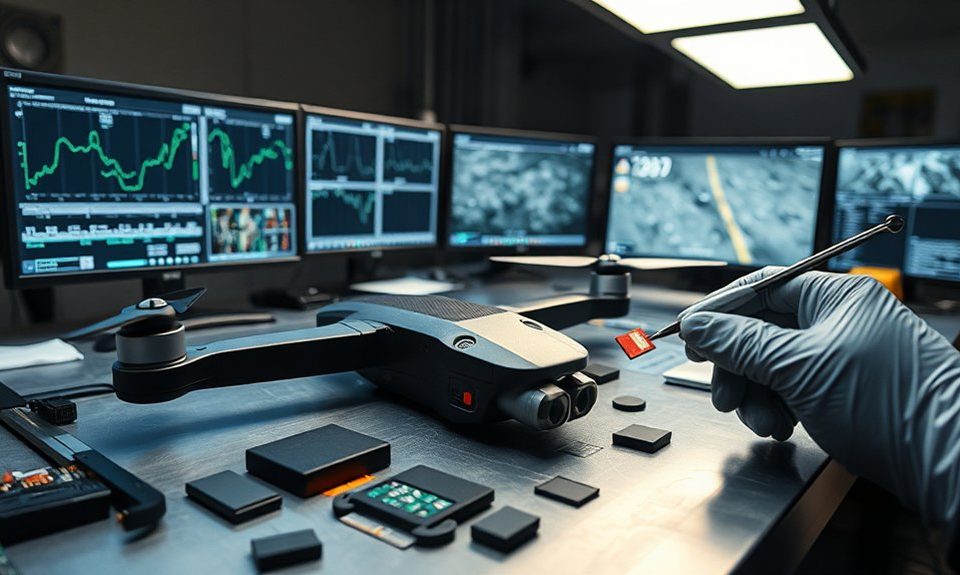Modern due diligence processes in 2025 incorporate advanced technologies like artificial intelligence, big data analytics, and blockchain to bolster efficiency and accuracy. AI algorithms streamline data analysis and identify potential risks, while big data analytics provide verification of information and uncover hidden patterns. Blockchain technology guarantees compliance through smart contracts and an immutable ledger. These innovations allow for real-time risk assessment, transforming risk management strategies into a competitive advantage. Further insights reveal the depth of these changes.
Key Takeaways
- AI algorithms drive efficiency and accuracy in data analysis for due diligence processes, identifying risks and opportunities swiftly.
- Big data analytics enables firms to verify information more effectively, uncovering hidden patterns and anomalies.
- Blockchain technology ensures compliance through smart contracts, reducing errors and enhancing trust among stakeholders.
- Automated data collection facilitates real-time updates, improving decision-making and overall efficiency in due diligence.
- Real-time risk assessment strategies empower organizations to adapt swiftly to emerging threats and opportunities.
The Role of Artificial Intelligence in Due Diligence

As organizations increasingly embrace technological advancements, the integration of artificial intelligence (AI) into due diligence processes has emerged as a transformative development. AI algorithms enhance the efficiency and accuracy of data analysis, allowing for more informed decision-making. By leveraging predictive modeling, these algorithms can foresee potential risks and opportunities, streamlining the evaluation of financial, operational, and legal aspects of a business. This capability enables organizations to identify red flags that may have otherwise gone unnoticed, fostering a culture of proactive risk management. Additionally, the data-driven insights provided by AI facilitate a deeper understanding of market trends and competitive landscapes, ensuring that due diligence is not merely a procedural formality but a strategic advantage in an increasingly complex business environment. Furthermore, engaging professional private investigators can further augment these efforts, ensuring comprehensive investigations tailored to specific business needs.
Big Data Analytics: Transforming Information Verification
The incorporation of big data analytics into due diligence processes greatly enhances the verification of information, building upon the capabilities offered by artificial intelligence. By leveraging vast datasets, organizations can employ predictive modeling to forecast potential risks and outcomes, allowing for more informed decision-making. Through sophisticated data visualization techniques, complex information is transformed into accessible formats, enabling stakeholders to grasp insights quickly and intuitively. This integration not only streamlines the verification process but also fosters deeper understanding and transparency. As data-driven methodologies become more prevalent, they empower firms to uncover hidden patterns and anomalies, ultimately enhancing the robustness of their due diligence efforts. The reliance on big data analytics signifies a transformative shift towards a more proactive and analytical approach in compliance and risk management. Additionally, professional investigators can provide significant evidence that supports data analysis and enhances the overall investigative process.
Blockchain Technology and Its Impact on Compliance
How can blockchain technology revolutionize compliance processes in organizations? By introducing smart contracts, blockchain enables automatic enforcement of compliance requirements, drastically reducing human error and administrative burdens. These self-executing contracts facilitate transparent transactions, ensuring that all parties adhere to established regulations without manual intervention. Furthermore, decentralized verification eliminates the need for centralized authorities, enhancing trust among stakeholders. Each transaction is recorded on an immutable ledger, which provides a clear audit trail for compliance audits. As organizations face increasing regulatory demands, integrating blockchain technology into compliance frameworks offers a robust solution, fostering accountability and reliability. The transformative potential of these innovations signals a significant shift in how compliance is managed, ultimately leading to more efficient and secure organizational practices. Additionally, the use of robust anti-fraud reporting systems can further enhance compliance efforts by identifying and preventing fraudulent activities in real-time.
Automated Data Collection: Enhancing Efficiency and Accuracy

Integrating advanced technologies like blockchain into compliance frameworks paves the way for enhanced methodologies in data management, particularly through automated data collection. This approach greatly boosts data accuracy and drives efficiency improvements across various sectors.
- Streamlined processes reduce manual intervention, minimizing human errors.
- Real-time data integration guarantees timely updates, enhancing decision-making capabilities.
- Advanced algorithms analyze vast datasets, providing deeper insights and predictive analytics.
- Understanding fraud trends is essential for businesses to maintain compliance and protect against risks associated with data management.
Real-Time Risk Assessment: Staying Ahead in a Complex Environment
Proactive risk management emerges as a critical component in traversing the complexities of today’s business landscape. In 2025, organizations increasingly rely on dynamic risk evaluation to navigate uncertainties effectively. This approach harnesses real-time data analytics, enabling firms to identify potential threats and opportunities as they arise. By integrating advanced algorithms and machine learning, businesses can assess risks on-the-fly, thereby fostering a culture of adaptability and responsiveness. Such methodologies not only enhance decision-making processes but also empower teams to anticipate challenges before they escalate. Consequently, proactive risk management transforms from a reactive measure into a strategic advantage, allowing companies to maintain resilience amid volatility. This dual focus on evaluation and action solidifies their position in an ever-evolving marketplace, while implementing robust internal controls ensures that organizations can effectively mitigate fraud risks.
Frequently Asked Questions
How Do Companies Ensure Data Privacy During Due Diligence Processes?
Companies prioritize data privacy during due diligence by implementing stringent data encryption methods and adhering to evolving privacy regulations. Such measures mitigate risks, ensuring sensitive information remains protected throughout the investigative process, fostering trust and transparency.
What Skills Are Essential for Due Diligence Professionals in 2025?
Essential skills for due diligence professionals include analytical thinking for thorough evaluation and risk assessment to identify potential pitfalls. Mastery of these competencies enables professionals to navigate complexities effectively, ensuring informed decision-making in a rapidly evolving landscape.
How Do Regulations Affect Due Diligence Practices Globally?
Regulatory impact considerably shapes due diligence practices, compelling organizations to adhere to global compliance standards. This necessitates thorough assessments of legal frameworks, ensuring that companies navigate the complexities of international regulations effectively and mitigate potential risks.
What Are the Common Pitfalls in Modern Due Diligence?
Common pitfalls in modern due diligence include relying on incomplete information and failing to recognize cultural misunderstandings. These factors can lead to misinformed decisions, ultimately undermining the integrity and effectiveness of due diligence processes.
How Can Small Businesses Leverage Due Diligence Effectively?
Small businesses can leverage due diligence strategies by identifying potential risks, enhancing credibility, and fostering investor trust. This proactive approach provides small business advantages, enabling informed decisions that drive sustainable growth and competitive differentiation in the market.
Conclusion
In 2025, modern due diligence processes are increasingly shaped by advancements in technology. Artificial intelligence and big data analytics enhance the accuracy and efficiency of information verification, while blockchain technology guarantees compliance and transparency. Automated data collection streamlines workflows, allowing for real-time risk assessment. As organizations navigate complex environments, these innovations collectively empower decision-makers to mitigate risks effectively and make informed choices, ultimately redefining the landscape of due diligence in a data-driven era.





